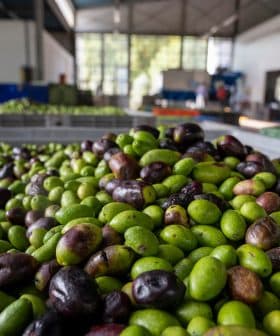Mediterranean Diet During Pregnancy Improves Infant Neurological Development

A Spanish medical research team conducted the IMPACT BCN trial to evaluate the effects of structured interventions based on the Mediterranean diet or stress reduction on neurodevelopment in children at age two. Children born to mothers who underwent these interventions showed higher cognitive and social-emotional scores, indicating potential benefits of maternal lifestyle interventions during pregnancy on offspring neurodevelopment.
A multidisciplinary team of Spanish medical researchers has published the results of the second stage of a major clinical trial.
The Improving Mothers for a Better Prenatal Care Trial Barcelona (IMPACT BCN) aimed to assess whether structured interventions, focusing on the Mediterranean diet or mindfulness-based stress reduction (MBSR), could decrease the percentage of newborns born small for gestational age (SGA) and improve other adverse pregnancy outcomes.
The main focus of this new analysis was a prespecified secondary endpoint aiming to investigate whether maternal interventions involving the Mediterranean diet or stress reduction during pregnancy could enhance neurodevelopmental outcomes in offspring at the age of two years.
See Also:Health NewsThe neurodevelopmental evaluation used the Bayley Scales of Infant and Toddler Development (Bayley-III), assessing cognitive, language, motor, social-emotional and adaptive behavior domains. The trial analysis took place between July and November 2022.
The original trial, conducted in Barcelona, included 1,221 pregnant individuals considered at high risk of delivering small for gestational age newborns. Enrollment occurred from February 2017 to October 2019, with follow-up continuing until delivery and concluding on March 1, 2020.
While numerous studies have demonstrated the potential benefits of the Mediterranean diet in reducing adverse health outcomes such as cardiovascular events, diabetes, cognitive decline and inflammatory-based diseases among high-risk adults, this was the first study of its kind to examine the potential neurological benefits to children through maternal diet during pregnancy.
Randomization placed participants into three groups: a nutritional intervention, a stress reduction intervention and a control group receiving standard care.
Data collection involved baseline and final visits, where participants answered questionnaires, provided biological samples and had perinatal data collected. Primary and secondary endpoints of the trial, including the percentage of newborns who were small for gestational age and adverse perinatal outcomes, had been published earlier.
The IMPACT BCN trial employed a parallel, unblinded, randomized clinical design conducted at BCNatal, a prominent center for maternal-fetal and neonatal medicine in Barcelona. Pregnant individuals at midgestation (19 to 23.6 weeks) with a high risk of delivering small for gestational age newborns were enrolled.
The trial aimed to ensure generalizability by recording race and ethnicity. Randomization occurred in a one-to-one ratio in the dietary intervention, stress reduction intervention, and control groups.
The Bayley-III evaluation showed that two-year-old children born to mothers who underwent structured lifestyle interventions based on the Mediterranean diet or stress reduction during pregnancy exhibited better scores in cognitive and social-emotional domains.
See Also:Consuming extra virgin olive oil Results in More Polyphenols in Breast Milk, Study FindsNotably, this is the first randomized clinical trial evaluating the impact of such interventions on child neurodevelopment.
The dietary intervention, rooted in the traditional Mediterranean diet adapted for pregnancy, included monthly individual and group sessions supplemented with extra virgin olive oil and walnuts.
Stress reduction participants received a mindfulness-based stress reduction program adapted for pregnancy, involving weekly group classes, a full-day session and daily home practice. Usual care participants followed standard pregnancy care protocols.
The assessment, conducted at the corrected age of 24 months, revealed that children in the Mediterranean diet group had significantly higher scores in both the cognitive and social-emotional domains compared to the usual care group.
Children in the stress reduction group showed higher scores in the social-emotional domain. No differences among the study groups were observed in language, motor and adaptive scores.
Exploratory analyses of the entire study population demonstrated positive associations between the Mediterranean diet score and cognitive and language Bayley-III domains.
A higher intake of docosahexaenoic acid, an omega‑3 fatty acid found in fish oils, was linked to better language scores. In comparison, higher trans fatty acid intake was inversely associated with social-emotional and language scores.
Trans fats, though naturally occurring in dairy products and animal fats, are more commonly ingested in the 21st century through the consumption of processed foods high in partially hydrogenated vegetable oils.
Levels of trans fats in the bloodstream of breastfed infants fluctuate with the amounts found in their milk, which in turn varies according to the mother’s diet. A 1999 study reported percentages of trans fats in proportion to total fats in human milk ranging from one percent in Spain to seven percent in Canada and the United States.
Although the authors note certain limitations of their study, such as the fact that participants were selected from among those deemed at high risk of adverse pregnancy outcomes, they conclude that structured maternal lifestyle interventions based on the Mediterranean diet during pregnancy contributed to improved cognitive and social-emotional scores in children at age two.
The team believes the findings support the notion that a healthy dietary pattern like the Mediterranean diet may positively influence fetal neurodevelopment. Randomized clinical trials and assessments in additional patient populations will further understanding of the mechanisms involved.









